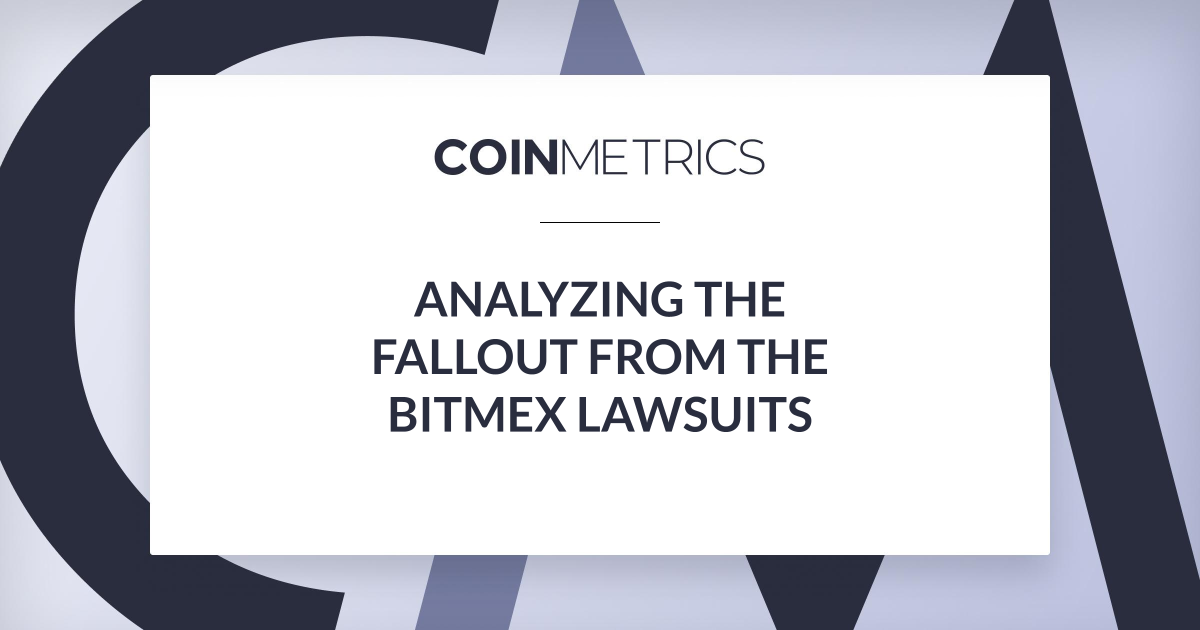On October 1st, the CFTC and Department of Justice jointly announced charges filed against BitMEX’s owners and operators. The CFTC is alleging they were illegally operating a derivatives trading platform and the Department of Justice that they violated various parts of the Bank Secrecy Act. BitMEX’s CTO, Samuel Reed, was arrested and released on a $5M bail the same day in Massachusetts.
The red line represents when the filings were made public
In this feature, we’ll look at the impact of these filings on BitMEX and the broader cryptocurrency ecosystem from different perspectives.
Not Your Keys, Not Your Coins
BitMEX stands out amongst cryptocurrency exchanges by how it stores its bitcoin. Instead of using the common hot/cold wallets structure, all the coins are held in cold storage. Withdrawals are processed once a day, usually around 1 PM UTC, and signed by 2 of the 3 BitMEX founders. A blog post by BitMEX details how this works and plays together with their broader security efforts.
From a technical point of view, each BitMEX address is a multisignature address that requires 3-of-4 keys to spend from. Three of the four keys are owned by one founder each. The fourth key is “mined” to ensure that each BitMEX’s addresses starts with a vanity prefix (either 3BMEX or 3BiTMEX). The latter key, also called “vanity key”, always signs the withdrawal transactions; then only 2 of the 3 founders are required to approve a withdrawal (it could also be that all 3 founders approve and the vanity key doesn’t sign, but this hasn’t happened in the last months we observed).
While the identities of the founders are known, it is not trivial to associate the public keys with its real life owner. By collecting the recent BitMEX withdrawals and identifying which keys signed for which withdrawal batch, we can make an educated guess which public key belongs to which founder.
Activity map showing which key signed for which withdrawal batch. The four additional off-cycle withdrawal batches not at 1 PM UTC are highlighted in red.
Most interestingly, key A didn’t sign on Oct 1st, when Samuel Reed was in custody. It has signed twice since the publication of the filings against BitMEX, both times presumably after Samuel Reed was released on bail. We further presume that key B belongs to Ben Delo and key C to Arthur Hayes.
The fact that all three founder keys have signed following the publication of the filings is reassuring for traders with funds on BitMEX. Had Mr Reed not been released on bail, any incapacitation of any of the two remaining founders could have meant a freeze of all the funds on the platform.
Samuel Reed’s bail prevents him from contacting the co-defendants without counsel being present. However, since his release on Oct 1st, all founder keys signed withdrawals. While Bitcoin multisignature is technically a non-interactive protocol, signing BitMEX withdrawals probably requires some level of interaction between the founders involved.
What remains unknown is whether the founder keys changed ownership since the publication of the filings. The fact that the 3 original founders stepped down from their executive roles at 100x, the parent company of BitMEX, seem to indicate such a transition has happened, or will happen soon.
Impact on BitMEX’s Wallet
Right after the publication of the filings and the arrest of BitMEX’s CTO, thousands of users withdrew funds from the platform. BitMEX also broke from its traditional once-a-day withdrawal processing and did 6 batches in 2 days to reassure traders that the funds were “SAFU”.
Using our database of tagged addresses, we can dig deeper into the direct destination of these withdrawals:
Platforms with products similar to BitMEX (Binance, Okex, Deribit, and Huobi) feature prominently in the list of destinations, along with traditional exchanges like Gemini, Bitstamp, et al.
Impact on Derivatives Market
BitMEX ruled for many years as Bitcoin’s emergent derivatives market. Its perpetual inverse swap saw trillions of dollars in volume and generated hundreds of millions in trading fees. But in 2020 it’s dominant position in the market became challenged by many competitors and BitMEX’s troubles in handling the March 12th crash marked its peak.
The recent filings are another blow to BitMEX’s standing:
While BitMEX’s competitors have gained market share, it remains to be seen whether the CFTC and DoJ will stop at BitMEX or continue going down the list of unregistered exchanges.
Conclusion
As indicated by the market’s tepid reaction to the publication of the CFTC and DoJ’s filing, BitMEX’s legal troubles were predictable. Other recent events like John McAfee’s arrest show that the US legal system is starting to crack down on the cryptocurrency ecosystem.
With only one of the three founders arrested, BitMEX avoided a solvency problem and managed to process the numerous withdrawal requests in a timely manner. As many precedents, like MtGox or QuadrigaCX, show, it is just a question of time until the arrest or death of crypto custodians triggers another solvency problem.
